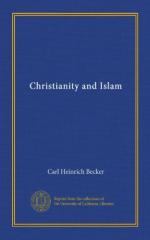The state, society, the individual, economics and morality were thus collectively under Christian influence during the early period of Muhammedanism. Conditions very similar in general, affected those conceptions which we explain upon scientific grounds but which were invariably regarded by ancient and mediaeval thought as supernatural, conceptions deduced from the phenomena of illness and dreams. Islam was no less opposed than Christianity to the practice of magic in any form, but only so far as these practices seemed to preserve remnants of heathen beliefs. Such beliefs were, however, continued in both religions in modified form. There is no doubt that ideas of high antiquity, doubtless of Babylonian origin, can be traced as contributing to the formation of these beliefs, while scientific medicine is connected with the earlier discoveries of Greece. Common to both religions was the belief in the reality of dreams, especially when these seemed to harmonise with religious ideas: dreams were regarded as revelations from God or from his apostles or from the pious dead. The fact that man could dream and that he could appear to other men in dreams after his death was regarded as a sign of divine favour and the biographies of the saints often contain chapters devoted to this faculty. These are natural ideas which lie in the national consciousness of any people, but owe their development in the case of Islam to Christian influence. The same may be said of the belief that the prayers of particular saints were of special efficacy, and of attempts by prayer, forms of worship and the like to procure rain, avert plague and so forth: such ideas are common throughout the middle ages. Thus in every department we meet with that particular type of Christian theory which existed in the East during the seventh and eighth centuries.




